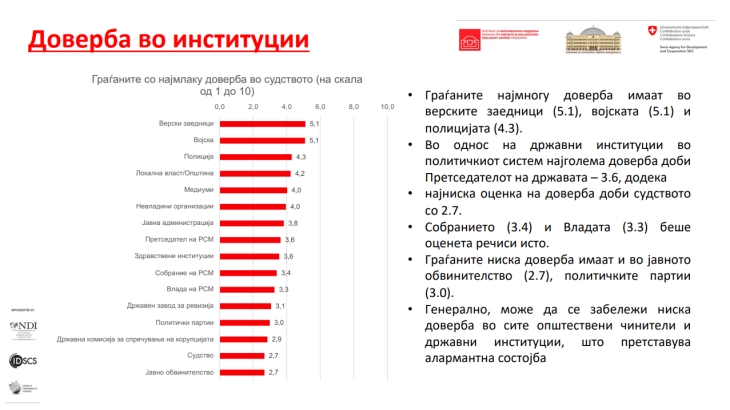Citizens have low trust in institutions, parties, trust religious communities and military the most: poll
- The citizens trust the religious communities (5.1), military (5.1) and police (4.3) the most, according to the latest research carried out as part of the Parliamentary Support Program, implemented by the National Democratic Institute (NDI), Institute for Democracy “Societas Civilis” Skopje (IDSCS) and Center for Change Management (CUP), with financial support from the Government of Switzerland.
- Post By Angel Dimoski
- 15:44, 25 May, 2023

Skopje, 25 May 2023 (MIA) – The citizens trust the religious communities (5.1), military (5.1) and police (4.3) the most, according to the latest research carried out as part of the Parliamentary Support Program, implemented by the National Democratic Institute (NDI), Institute for Democracy “Societas Civilis” Skopje (IDSCS) and Center for Change Management (CUP), with financial support from the Government of Switzerland.
The short report on the annual research concerning the public perception of Parliament’s work, quality of life, political issues and trust in the institutions in North Macedonia, contains information based on the opinions of citizens which assessed a series of issues on a scale of 1 to 10.
When it comes to the most important institutions in the political system, the President of the country received the highest trust score with 3.6 out of 10, while the judiciary received the lowest score – 2.7. Parliament (3.4) and the Government (3.3) received almost the same score. The citizens also have a low trust in the public prosecution (2.7) and in the political parties (3.0). Generally, low trust can be noted in all social stakeholders and state institutions.
The research shows that more than two thirds of citizens believe that life in the country is moving in the wrong direction (69 percent), with the citizens of the Vardar region being the most pessimistic (80 percent).
The perception of a dominant majority of surveyed citizens (79 percent) is that the MPs are entirely or partially dependent on the will of the leaders of their political parties. According to the participants in the focus groups, there is a “strict party hierarchy in which the elites in higher positions make agreements, while the others implement them.”
Slightly more than half of respondents (52 percent) agree that a change in the electoral model could contribute to a reduction of the MPs’ dependence on party leaders.
In answer to the question “If elections were to be held next week, which party would you vote for?” more than half of respondents said they would not vote, or they didn’t know who they would vote for. Seventeen percent of respondents said they would vote for VMRO-DPMNE, 12 percent for SDSM, 8 percent for DUI, 4 percent for Levica, 3 percent for Alliance for Albanians, while 1 percent said they would vote for the Besa Movement.
The in-person poll was carried out in the entire territory of the country during the period between February 22 and March 9, 2023, on a sample of 1.002 respondents over the age of 18.
Photo: Printscreen







